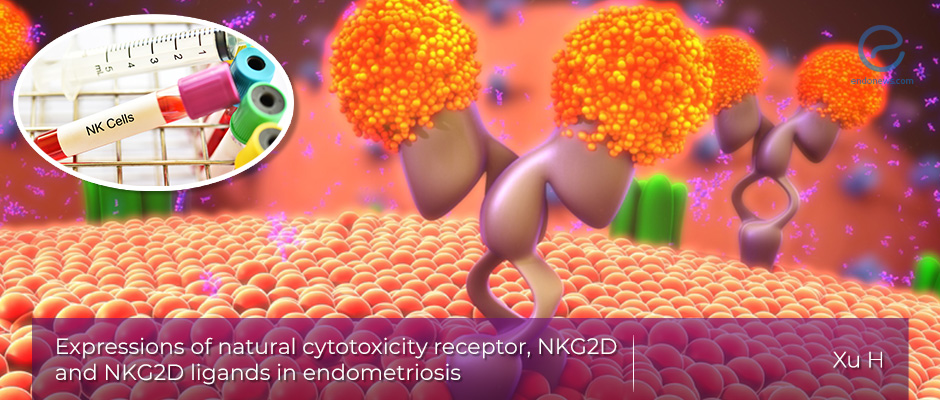Natural killer cells receptor expression in endometriosis
Dec 19, 2019
What do killer signals tell us about endometriosis?
Key Points
Highlight:
- Alterations in the expression of natural killer (NK) cell-activating receptors suggest that endometriosis may be related to in local immune system alterations.
Importance:
- The changes in the expression of NK cells receptors and their ligands may help better-understanding endometriosis pathogenesis, hence will have an impact on therapy.
What's done here:
- Women with ovarian endometriosis (n=20) and control subjects (n=13) were recruited.
- Expression of natural cytotoxic cell receptors and NKG2D, a transmembrane receptor on natural killer cells were examined in peripheral blood, peritoneal fluid and in endometrial cells.
- Endometrial cells were collected from the eutopic endometrium of patients with and without endometriosis, and endometriotic tissues.
Data:
- In the peripheral blood, the expression of cytotoxic cell receptors on NK cells from endometriosis was decreased compared to controls; and the expression of NKp46 was higher.
- The ligand for NKG2D, namely ULBP-2 protein expression in the eutopic endometrial cells from endometriosis was lower than the expression in ectopic endometrial cells from endometriosis and eutopic endometrial cells from control.
- Another ligand, ULBP-3 expression in ectopic endometrial cells was lower than in the eutopic endometrial cells with or without endometriosis.
Limitation:
- The study is limited by the small number of samples studied and surface markers used to identify NK cells.
Lay Summary
Increasingly, studies have reported that endometriosis pathogenesis is related to defect in immune functions. The data also points to the impaired function of natural killer (NK) cells, leading to less cytotoxic NK cell activity in endometriosis. Similar to B and T lymphocytes, NK cells generally have a crucial function in human immunity, as they represent the third largest lymphocyte population in the peripheral blood. To identify NK cells, researchers have used the positive expression of surface markers. In a normal setting, NK cells function as effectors, cytokine producers and potential regulators in adaptive immunity. Therefore, an understanding of how NK cells are activated/inhibited is crucial for endometriosis pathogenesis. This process is carried out by a set of activating or inhibitory receptors on NK cells.
To identify their targets, NK cells use receptors to ligands interactions. NKG2D is a transmembrane receptor on NK cells and specifically bind to ligands UL16-binding proteins (ULBPs). Despite reduced NK cells activity in endometriosis, it is unclear how activating receptors on NK cells are altered.
The current article published in the "Journal of Reproductive Immunology" by Xu et al. from Shanghai Jiaotong University School of Medicine, China investigated the expression of NCRs and NKG2D on NK cells in peripheral blood, peritoneal fluid and in endometrial cells from women with pelvic endometriosis.
The study recruited 20 patients with ovarian endometriosis who underwent a laparoscopic or a laparotomy surgery for endometriosis. The cohort included 2 patients at stage II, 6 at stage III and 12 at stage IV endometriosis. There was no significant difference in NCRs and NKG2D expression on NK cells from the peripheral blood between the endometriosis and the control groups. However, the expression of NKp30 and NKG2D on NK cells derived from the peritoneal fluid in women with endometriosis were reduced as compared to control. In contrast, the expression of NKp46 was higher than that in the control. Moreover, ULBP-2 expression was lower in endometriosis eutopic endometrium as compared to normal eutopic endometrium. The expression of ULBP-3 was also lower in ectopic endometrium than eutopic endometrium.
The difference of NK cells receptor expression in peritoneal fluid, but not in peripheral blood suggests that endometriosis is potentially a result of local dysregulation of the immune system. Alterations of NKG2D ligands expression and NKG2D-mediated immune responses are a potential feature of autoimmune diseases and suggest a closer link between endometriosis and autoimmune disorders.
Finally, alterations in NK cells activating receptors or ligand responses may provide new immunotherapeutic approaches for endometriosis by improving immune surveillance.
Research Source: https://www.ncbi.nlm.nih.gov/pubmed/31655348
inflammation immune cell NK cells receptors peritoneal fluid ligand immunotherapy

